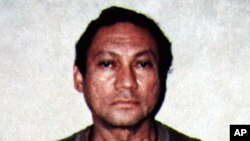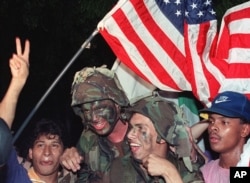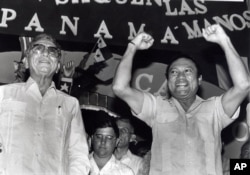Twenty-seven years ago on January 3, Panama’s General Manuel Antonio Noriega surrendered to the United States military to face charges of drug trafficking.
The Panamanian military dictator finally gave up after hiding for 10 days at the Vatican embassy in Panama City where he fled after a U.S. military invasion. Crowds lined the streets of the capital the next day when Noriega was flown to Miami.
In 1992, the former dictator was convicted of drug trafficking, money laundering and racketeering in Miami, Florida, and sentenced to 40 years in prison. He made history again by becoming the first foreign head of state to be convicted in a U.S. court.
Noriega was employed by the U.S. Central Intelligence Agency as an intelligence source from the 1950s, and remained on the CIA payroll until the late 1980's. He was instrumental in transporting weapons, military equipment and cash to the U.S.-supported "contras" - a guerrilla force fighting against Nicaragua's leftist Sandinista government. He also was a high-end seller of cocaine, though his U.S. handlers reportedly knew about this activity but looked the other way because of his value to their secret military operations.
Noriega emerged as general of Panama’s military forces — and the de facto leader of the country — after the death of former leader General Omar Torrijos, who seized power in a 1968 coup.
Noriega’s rule was marked by corruption and violence. He also became a double agent, selling American intelligence secrets to Cuba and Eastern European governments. In 1987, when Panamanians organized protests against Noriega and demanded his ouster, he declared a national emergency, shut down radio stations and newspapers, and forced his political enemies into exile.
That year the United States cut off aid to Panama and tried to get Noriega to resign; in 1988, the U.S. began considering the use of military action to put an end to his drug trafficking. Noriega voided the May 1989 presidential election, which included a U.S.-backed candidate.
In December, he declared a state of war with the United States. After an American marine was killed by Panamanian soldiers, then President George H.W. Bush authorized “Operation Just Cause.”
On December 20, 1989, 13,000 U.S. troops were sent to occupy Panama City, along with the 12,000 already stationed there in the Panama Canal Zone, and seize Noriega. During the invasion, 23 U.S. troops were killed in action and more than 300 were wounded.
Noriega was sentenced to 40 years in prison, later reduced to 30 years, by a Miami court after being tried on eight counts of drug trafficking, racketeering, and money laundering. In 2010, Noriega was extradited to France to face charges there and then, a year later, he was sent to Panama where he is now in prison for the crimes committed during his rule.











